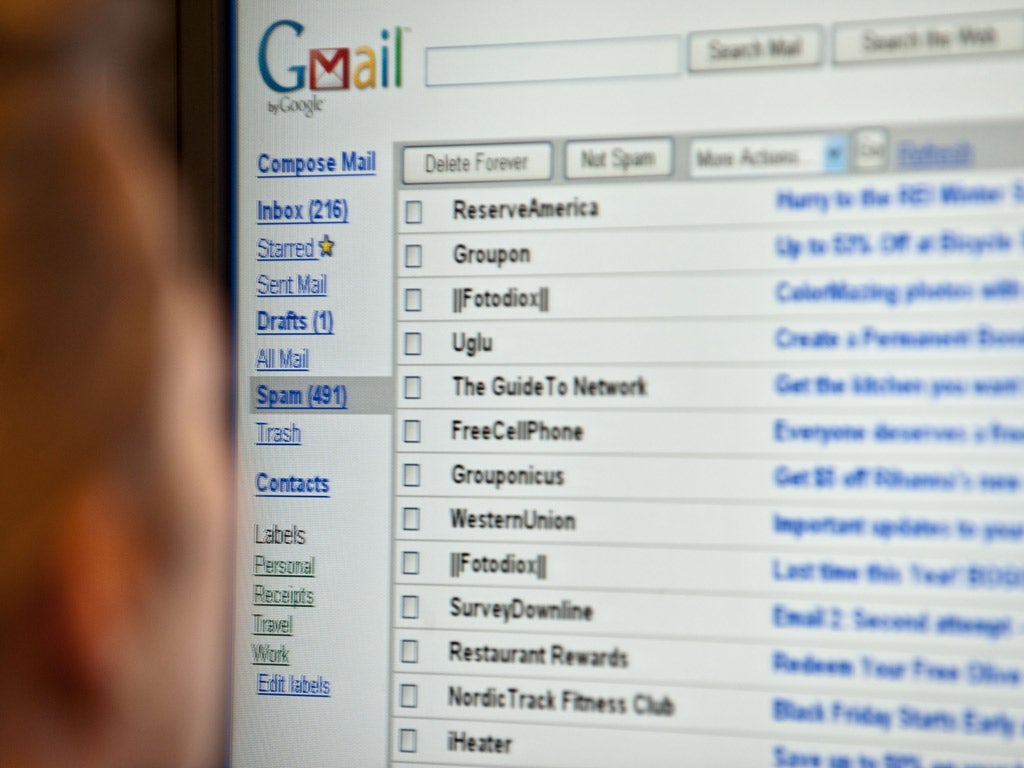Are we facing the death of email?
First the Twitterati logged off. Now a high-tech office has abandoned it altogether. So is the writing on the wall for our most popular form of communication? Adam Sherwin gets the message

Your support helps us to tell the story
From reproductive rights to climate change to Big Tech, The Independent is on the ground when the story is developing. Whether it's investigating the financials of Elon Musk's pro-Trump PAC or producing our latest documentary, 'The A Word', which shines a light on the American women fighting for reproductive rights, we know how important it is to parse out the facts from the messaging.
At such a critical moment in US history, we need reporters on the ground. Your donation allows us to keep sending journalists to speak to both sides of the story.
The Independent is trusted by Americans across the entire political spectrum. And unlike many other quality news outlets, we choose not to lock Americans out of our reporting and analysis with paywalls. We believe quality journalism should be available to everyone, paid for by those who can afford it.
Your support makes all the difference.Imagine it: a life freed from the drudgery of deleting an inbox full of "unbeatable offers" and the latest missive on paper clips from head office. Email could follow the telex into the dustbin of communication tools we have loved and discarded if Thierry Breton, CEO of the information technology services company Atos, is a guide to the future.
Breton is to ban his staff from sending each other emails, complaining that they waste time and are outmoded. Only 10 per cent of the 200 electronic messages his employees receive per day turn out to be useful, Breton claims. "The deluge of information will be one of the most important problems a company will have to face [in the future]. It is time to think differently," he claimed.
Internal email will be phased out inside 18 months at Atos. The 75,000 staff will instead use instant messaging and chat-style collaborative services inspired by social networking sites such as Facebook or Twitter. Atos staff used to spend between five and 20 hours a day dealing with email, but use of Breton's replacements has cut its use by up to 20 per cent, the firm claims.
His strategy has already been adopted by teenagers, who are shunning the now middle-aged email, which was first developed in 1971. Email use is down 31 per cent among the 12-17 age group this year, with a further 21 per cent slump among those aged 18-24.
Mobile Instant Messaging (IM) services such as Blackberry Messenger and Yahoo! Messenger, designed to facilitate low-cost, real-time communication around each X Factor performance, have supplanted ponderous email for the tech-savvy next generation. Mobile IM users are predicted to exceed 1.3 billion worldwide by 2016.
It's a development which Mark Zuckerberg sought to capitalise on with Facebook Messages, the social network's "modern messaging system", which merges text messages, IM and email into a single interface for 750 million users. "High school kids don't use email, they use SMS a lot," the 27-year-old technology pioneer said. "People want lighter-weight things like SMS and IM to message each other." For users, IM offers the immediacy that an email, often left unread, cannot.
However, if those teens are fortunate enough to find jobs, they are likely to still find themselves enmeshed in email's spam-blighted, sclerotic grip. The proportion of companies sending more than 50,000 emails each month has gradually increased in the last four years, from 40 per cent in 2007 to almost two thirds (60 per cent) in 2011. Spam still accountsfor an estimated 89 per cent of all emails.
Tim Walters, senior analyst at the technology research company Forrester Research, said: "Email is disruptive, wastes a great deal of time and it's miserable as a collaborative tool. But it's still used daily by 85 per cent of workers." He added: "Email isn't a beast to be killed. Sometimes it's the most appropriate tool for communication. Other timespeople send them thoughtlessly or to coverthemselves at work. And in government, emails have much greater potential for future discovery than IM."
What could replace email as a hassle-free, more collaborative communication tool? Yammer, a micro-blogging "Facebook for business" which allows groups of employees to share ideas through private communication, is now used by more than 80,000 firms.
Breton has introduced the Atos Wiki, which allows all employees to communicate by contributing or modifying online content, and Office Communicator, the company's online chat system which allows video conferencing, file and application sharing.
If email is dying, it will be a lingering demise. Without a ready audience through email, deal-a-day website Groupon would not have built a network of 143 million subscribers. More than 107 trillion emails will be sent this year, while the IM industry is hampered by fragmented services whichdo not communicateeach other.
But the Instant Messaging Generation Y, when they break into the workforce, are likely to demand new, liberating communication tools and free us from the web of email despair. Mr Walters said: "The Atos directive is working because the average age of their employees is 35 – it reflects their young workforce."
How to switch: The alternatives replacing email
Widely used for newsgathering, broadcasting and simply passing time, but has not become a major communications tool, although it does have a private messaging service.
What unites most users is that it is a personal communications tool, rather than one to be used at work.
Google Docs
Create a document, save and publish it and allow people to share and edit it: simple and effective. Could be used to post messages to large numbers of people at once.
BBM/WhatsApp
Instant messenger services are already widely used; the newer version is mobile instant messaging apps.
Join our commenting forum
Join thought-provoking conversations, follow other Independent readers and see their replies
Comments